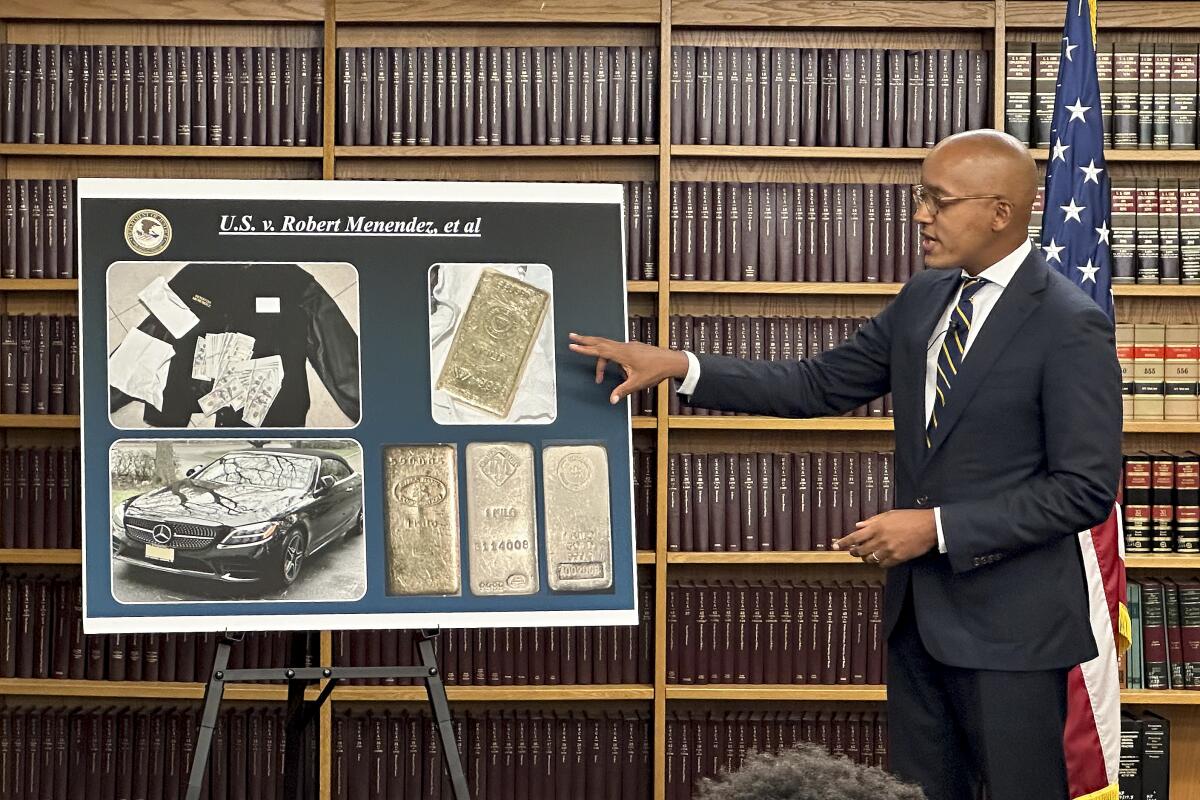Why would Egypt need to bribe a U.S. senator?

WASHINGTON — Why in the world would Egypt need to bribe a U.S. senator?
Taking bribes in exchange for aiding Egypt is one of the allegations against Sen. Robert Menendez (D-N.J.), the powerful chair of the Senate Foreign Relations Committee, who was indicted last month along with his wife and others.
On Thursday, federal prosecutors filed a new indictment that added the allegation that Menendez and his wife conspired for him to act as an unregistered foreign agent for Egypt.
Prosecutors say that Menendez repeatedly sought to help Egypt get around restrictions on aid imposed by Congress because of the country’s human rights record. Those actions included ghost-writing a letter to other senators asking them to lift a hold on $300 million destined for Egypt. Menendez and his wife, Nadine Arslanian, have denied wrongdoing.
But why would Egypt, a longtime U.S. ally, need Menendez’s help in the first place?
To understand, it helps to know a little history.
For years, Egypt was the second-largest recipient of U.S. aid, behind Israel.
This was in part reward for Egypt’s willingness to recognize Israel (almost unique in the Middle East) and cooperate with security involving the Gaza Strip, the Palestinian land along the Mediterranean Sea now engulfed in war with Israel.
During the three-decade rule of autocrat Hosni Mubarak, the relationship puttered along more or less stably, despite widespread reports of corruption and election-rigging but often with Egypt stepping up to provide valuable security in conflicts in the region.
That changed during the Arab Spring, when in 2011 nearly three weeks of demonstrations forced Mubarak from power. He was eventually tried on charges related to the killing of demonstrators in Cairo’s Tahrir Square, an iconic center in the quest for democracy.
Mubarak was replaced, briefly, by a Muslim Brotherhood presidency, but Abdel Fattah Sisi came to power after a military coup in 2013, and he remains president today.
Egypt has displayed scant regard for human rights ever since, activists say. “Thuggish behavior [by government agents] has been the norm” under Sisi, targeting journalists, political opponents and human rights activists, New York-based Human Rights Watch said in a recent report.
Sisi, who met with President Biden last year on the margins of a climate summit in Egypt, and who has met on a couple of occasions with Secretary of State Antony J. Blinken, has largely turned a deaf ear to private U.S. entreaties for release of prisoners and other human rights considerations, officials say.
Over time, that human rights record has eroded congressional support for unfettered aid to Egypt — a shift prosecutors allege Menendez was working to stop.
Last month, a group of senators led by Christopher S. Murphy (D-Conn.) applauded a separate decision by the Biden administration to withhold $85 million in military aid for Egypt and called for restricting an additional $235 million in security aid, saying Sisi had failed to make progress on human rights.
“Egypt has released more than 1,600 political prisoners since early 2022. That’s good news,” Murphy said at the time. “During that same time, they have jailed 5,000 more. So for every political prisoner that Egypt releases, three more are jailed. That’s one step forward, and three steps back. That’s not the kind of ‘clear and consistent progress’ in releasing political prisoners that the [U.S.] law requires.”
In a long and often impassioned speech, Murphy went on to answer those in Congress who argue that Egypt would end its security cooperation — including counter-terrorism efforts in the Sinai desert — if the aid is cut, saying that has not happened yet. Murphy noted that past administrations from both parties, under Presidents Obama and Trump, had ignored the need to restrict aid to Egypt but said that “now the Biden administration must hold the line.”
Biden ultimately released the $235 million in security aid, disappointing Murphy, who called it a “missed opportunity to show the world that our commitment to advancing human rights and democracy is more than a talking point.” Last month, Murphy called on Menendez to step down.
More to Read
Sign up for Essential California
The most important California stories and recommendations in your inbox every morning.
You may occasionally receive promotional content from the Los Angeles Times.











